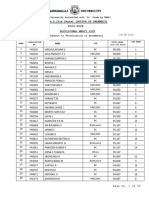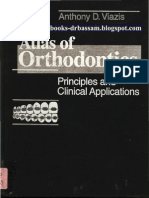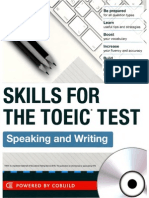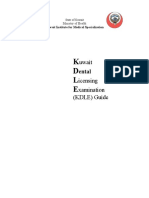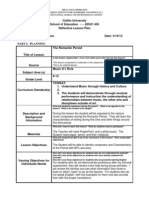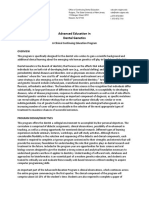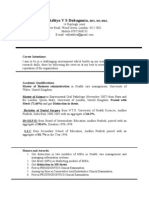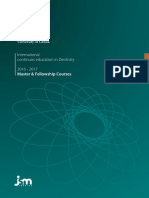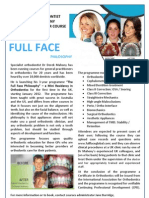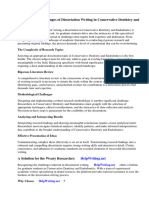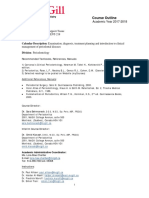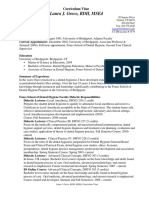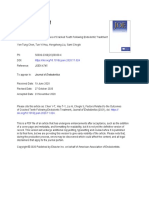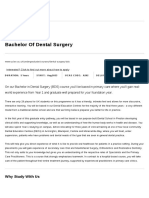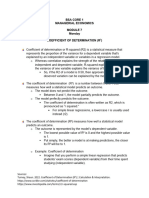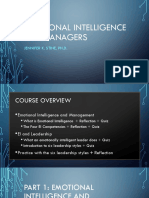Ortho Re Sprog
Ortho Re Sprog
Uploaded by
upul85Copyright:
Available Formats
Ortho Re Sprog
Ortho Re Sprog
Uploaded by
upul85Original Description:
Copyright
Available Formats
Share this document
Did you find this document useful?
Is this content inappropriate?
Copyright:
Available Formats
Ortho Re Sprog
Ortho Re Sprog
Uploaded by
upul85Copyright:
Available Formats
. . . . . . . . . .
.
.
.
.
.
.
.
.
.
.
Faculty of Dentistry
Division of Graduate Dental Studies
ORTHODONTI C
Residency Training Programme
leading to the degree of
Master of Dental Surgery (MDS)
11 Lower Kent Ridge Road, Singapore 119083
Tel: (65) 67724965 Fax: (65) 67796520
Website: www.dentistry.nus.edu.sg
contents
1 Introduction
2 Teaching Staff
3 Objectives of the Programme
1 INTRODUCTION
The Residency Training Programme in Orthodontics is a 3-year full-time course leading
to the degree of Master of Dental Surgery. The programme is accredited by the Royal
College of Surgeons of Edinburgh to enable candidates who successfully complete the
course to sit for the Membership in Orthodontics (MOrthRCS Edinburgh). This enables
the acquisition, by assessment, of the Fellowship of the College of Surgeons (FDSRCS
Edinburgh) after 5 further years of clinical practice as a specialist.
The programme is administered at the Faculty of Dentistry by the Division of Graduate
Dental Studies and at the National Dental Centre by the Department of Orthodontics.
There is a planned admission of 3 students each year with applications for admission
being invited in October. The course commences in J uly, and the examinations for
each of the 3 years are held in J une.
The course consists of clinical and didactic components held at the Faculty of Dentistry
and the National Dental Centre.
The fixed appliance techniques taught in the orthodontic programme are a variation of
the Straightwire Technique and the Tip-Edge Appliance. Diagnosis and treatment
planning sessions, together with case progress discussions are held weekly and a
journal club assists the candidates with guided journal reading. A combined clinic
where orthognathic cases are discussed is regularly held.
A thesis is part of the course requirements. The literature survey is completed at the
end of the first year, with the draft thesis being presented at the end of the second
year. The bound volume is handed in the month of J anuary in the final year.
The selection of 5 clinical cases for final examination will be made from a total of 10
presented cases, and the candidates will assist the clinical teachers in the final
selection. The final examination format is enclosed as a document within this booklet.
2 TEACHING STAFF
PROGRAMME DIRECTOR: Assoc Prof Kelvin Foong Weng Chiong
BDS, MDS Ortho (Adelaide), MOrthRCS
(Edin), FAMS, FDSRCS (Edin), PhD
PROGRAMME CO-DIRECTOR: Cl Assoc Prof Mimi Yow
BDS, FDSRCS (Edin), MSc (Lond), FAMS
FACULTY OF DENTISTRY
Assoc Prof Kelvin Foong Weng Chiong
BDS, MDS Ortho (Adelaide), MOrthRCS (Edin), FAMS, FDSRCS (Edin), PhD
Dr Henry Ho Chee Wai
BDS, MDS Ortho (Adelaide), MOrthRCS (Edin)
Dr Hwang Yee Cheau
BDS (Lond), DOrthRCS, MSc Ortho (Lond), FDSRCPS (Glas), MOrthRCS (Edin)
Dr Kaan Sheung Kin
BDS, MSc (Glas), DDORCPS (Glas), MDORCPS (Glas)
Dr Koh Chay Hui
BDS, MSc Ortho (Lond), DOrthRCS (Eng)
Dr Ong Hoe Boon
BDS, Dip Clin Dent(Melb), MSc(Melb), MOrthoRCS(Edin), FAMS
Dr Soh Jen
BDS, MDS (Spore)
Dr Tan Hwee Hiang
BDS, MSc Ortho (Lond), D OrthRCS (Eng)
Dr Tan Tzee J en
BDS, MSc Ortho (Lond), D OrthRCS (Eng)
Prof Toshio Deguchi
DDS, MSD, PhD, FDSRCSE (Hon)
NATIONAL DENTAL CENTRE
Dr Ivan Lim Kuen Fui
BDS, DOrthRCS (Edin), MDS (Spore), MDO RCPS (Glas), FAMS
Cl Assoc Prof Mimi Yow
BDS, FDS RCS (Edin), MSc (Lond), FAMS
Dr Chew Ming Tak
BDS, MDS (Spore), MOrthRCS (Edin)
Dr Yeong Ming Geok, Patricia
BDS, MDS (Spore), MOrthRCS (Edin), FAMS
Dr J ohanna Choo
BDS, MSc (USA), Cert Ortho (USA), FAMS
Dr Ching Siew May, Eileen
BDS, MDS (Leeds), MOrthRCS (Edin), FAMS
Dr Wong Yoke Cheng, Rosalind
BDS, DOrthRCS (Edin), MDO RCPS (Glas)
COMMITTEE FOR ORTHODONTICS
Assoc Prof Kelvin Foong Weng Chiong (Chairman)
Dr Chew Ming Tak
Dr Hwang Yee Cheau
Dr Kaan Sheung Kin
Dr Soh J en
Cl Assoc Prof Mimi Yow
3 OBJECTIVES OF THE PROGRAMME FOR
SPECIALTY EDUCATION IN ORTHODONTICS
The general objective of the programme is to educate dentists to become specialists in
orthodontics with a solid and broad academic background and adequate clinical
experience in different treatment methods.
The graduate should be able to:
- diagnose anomalies of the dentition, facial structures and functional conditions
- detect deviations of the development of the dentition, of facial growth, and
occurrence of functional abnormalities
- formulate a treatment plan and predict its course
- evaluate psychological aspects relevant to orthodontics
- conduct interceptive orthodontic measures
- execute simple and complex treatment procedures
- act as an expert in orthodontics and related matters
- collaborate in multidisciplinary teams for treatment of compromised patients,
orthodontic-surgical treatment and care of cleft palate patients
- evaluate need for orthodontic treatment
- practise orthodontics with high professional and ethical standards
- use available opportunities for improving professional skills
In addition, emphasis is placed on:
- biomedical sciences relevant to orthodontics
- development of a scientific attitude in an inquiring mind and stimulation of
professional interest
- principles of scientific methodology
- interpretation of literature
- research activities
- oral and written presentation of clinical and research findings
The curriculum is based on the recommendation of the ERASMUS report on
postgraduate education in orthodontics. The detailed report is published in
European J ournal of Orthodontics 1992; 14:85-94.
You might also like
- Pharmd Provisional Merit List 2023 24Document36 pagesPharmd Provisional Merit List 2023 24mani PrakashNo ratings yet
- Esthetic DentistryDocument252 pagesEsthetic Dentistryreered92% (12)
- Kuhas Bds SyllabusDocument127 pagesKuhas Bds SyllabusDrAjey BhatNo ratings yet
- Atlas of Orthodontics - ViazisDocument320 pagesAtlas of Orthodontics - ViazisAdil Houem100% (20)
- Skills For The TOEIC Test Speaking and Writing - 2012Document192 pagesSkills For The TOEIC Test Speaking and Writing - 2012Kamachi Koreysky100% (4)
- Master's in Clinical Dentistry (MClinDent) EndodontologyDocument8 pagesMaster's in Clinical Dentistry (MClinDent) Endodontologybadar_aqNo ratings yet
- Kdle TextDocument8 pagesKdle Textdrrajesh27100% (2)
- Liverpool SDL CRRTDocument62 pagesLiverpool SDL CRRTupul85No ratings yet
- Ore Reading ListDocument3 pagesOre Reading Listupul85No ratings yet
- Lesson Plan Romantic PeriodDocument3 pagesLesson Plan Romantic Periodjordanjefferson89% (9)
- Managing and Leading People 2e Sample ChapterDocument19 pagesManaging and Leading People 2e Sample ChapterShirley FarraceNo ratings yet
- Grad Pros Syl Lab Us 2014Document45 pagesGrad Pros Syl Lab Us 2014Mostafa FayadNo ratings yet
- Dental GeneticsDocument5 pagesDental GeneticsLjubomirErdoglijaNo ratings yet
- Education Dental PriemereDocument20 pagesEducation Dental Priemerengurah_wardanaNo ratings yet
- Perio-Prog Class 2012Document80 pagesPerio-Prog Class 2012moorenNo ratings yet
- DR Rakesh KathiriyaDocument6 pagesDR Rakesh Kathiriyadrrakeshkathiriya1No ratings yet
- Destiny and DevilDocument177 pagesDestiny and DevilSrinivasan NarasimhanNo ratings yet
- Dentistry Study Program 2014 - 2Document153 pagesDentistry Study Program 2014 - 2Saleh AlsadiNo ratings yet
- Implant DentistryDocument11 pagesImplant DentistryDentist ChandraShekarNo ratings yet
- Genoa Brochure Per WebDocument56 pagesGenoa Brochure Per WebJayanth KumarNo ratings yet
- The Bachelor of Dental Surgery Prepares Students For PatientDocument3 pagesThe Bachelor of Dental Surgery Prepares Students For PatientAmrutha DasariNo ratings yet
- Orthodontics DClinDentDocument10 pagesOrthodontics DClinDentmubthasimimdadNo ratings yet
- Periodontics Specialty Training Curriculum 2023 - ADocument34 pagesPeriodontics Specialty Training Curriculum 2023 - AMert CelikNo ratings yet
- Accreditation of Postgraduate Speciality TrainingDocument13 pagesAccreditation of Postgraduate Speciality TrainingHari PriyaNo ratings yet
- PGDIM2015Document12 pagesPGDIM2015haneefmdfNo ratings yet
- Icaard Guidebook 2021Document33 pagesIcaard Guidebook 2021May NweNo ratings yet
- PCL Dental Science, 2065Document85 pagesPCL Dental Science, 2065bibekghale8588No ratings yet
- Master's Degree in Periodontology: COURSE 2023-2024Document14 pagesMaster's Degree in Periodontology: COURSE 2023-2024Liseth CarreñoNo ratings yet
- Dental TherapyDocument9 pagesDental TherapyKatey DavidsonNo ratings yet
- Full Face Orthodontics CourseDocument1 pageFull Face Orthodontics CourseChris BarrowNo ratings yet
- Course Specification Crown and Bridge DoctorateDocument6 pagesCourse Specification Crown and Bridge DoctorateamrsheblksNo ratings yet
- SOD DDS Curriculum Overview 21-22Document32 pagesSOD DDS Curriculum Overview 21-22caychoelviscNo ratings yet
- Methods of Diagnosis and Treatment in Endodontics: A Systematic ReviewDocument32 pagesMethods of Diagnosis and Treatment in Endodontics: A Systematic ReviewHadil Altilbani100% (2)
- Booklet+2013 IADSDocument44 pagesBooklet+2013 IADSMariana BosovNo ratings yet
- Dental Assisting CoursesDocument8 pagesDental Assisting Coursessongyifei0903No ratings yet
- Syllabus Dental TechnologyDocument61 pagesSyllabus Dental TechnologyAsad Khan5556No ratings yet
- Endodontics: Advanced Education ProgramsDocument2 pagesEndodontics: Advanced Education ProgramsWilliamNo ratings yet
- Rguhs Thesis Topics in Oral and Maxillofacial SurgeryDocument6 pagesRguhs Thesis Topics in Oral and Maxillofacial Surgeryafbtbakvk100% (1)
- Dissertation Topics in Conservative Dentistry and EndodonticsDocument9 pagesDissertation Topics in Conservative Dentistry and EndodonticsWriteMyPaperJackson100% (1)
- Methods of Diagnosis and Treatment in Endodontics: A Systematic ReviewDocument383 pagesMethods of Diagnosis and Treatment in Endodontics: A Systematic Reviewامير كاظم علي حسينNo ratings yet
- 9 Example Thesis For SOP 2014-02-10Document31 pages9 Example Thesis For SOP 2014-02-10phileasfoggscribNo ratings yet
- Maxillofacial ProsthodonticsDocument12 pagesMaxillofacial ProsthodonticsManjeev GuragainNo ratings yet
- European Society of Endodontology: Abstracts From The Biennial Congress 2015Document80 pagesEuropean Society of Endodontology: Abstracts From The Biennial Congress 2015CHOUCHOU12485No ratings yet
- ENDO BritishDocument105 pagesENDO BritishVincent Ser100% (24)
- Diploma of Oral Surgery-RWTH Aachen UniversityDocument11 pagesDiploma of Oral Surgery-RWTH Aachen UniversitySjcjdjdjxNo ratings yet
- ZDENT 218 Support Tissue - Course Outline (2017-2018) FINALIZEDDocument11 pagesZDENT 218 Support Tissue - Course Outline (2017-2018) FINALIZEDjdazuelosNo ratings yet
- Section 1: What Is Dentistry? 2 S 2: W ? 2 Section 3: Why Be A Dentist? 2Document4 pagesSection 1: What Is Dentistry? 2 S 2: W ? 2 Section 3: Why Be A Dentist? 2Marwa IbrahimNo ratings yet
- Int Endodontic J - 2023 - DuncanDocument58 pagesInt Endodontic J - 2023 - DuncanAli FaridiNo ratings yet
- The Tamilnadu DR MGR Medical University Chennai 600 0324699 PDFDocument18 pagesThe Tamilnadu DR MGR Medical University Chennai 600 0324699 PDFsrinandanNo ratings yet
- OrthodonticassessmentDocument44 pagesOrthodonticassessmentナスティオン ファジャルNo ratings yet
- Course No. Course Title Contact Hours Credits Theory PracticalDocument6 pagesCourse No. Course Title Contact Hours Credits Theory PracticalMai El-SharnobyNo ratings yet
- 10 1111@eje 12552Document24 pages10 1111@eje 12552Judith ChanNo ratings yet
- Mds - Curriculum (Hust) Tongji Medical CollegeDocument45 pagesMds - Curriculum (Hust) Tongji Medical CollegeMukunda RegmiNo ratings yet
- Laura J. Greco, RDH, Msed: Curriculum VitaeDocument7 pagesLaura J. Greco, RDH, Msed: Curriculum VitaeMuhammad FiazNo ratings yet
- Contemporary Undergraduate Implant Dentistry Education A Systematic ReviewDocument13 pagesContemporary Undergraduate Implant Dentistry Education A Systematic ReviewfloraNo ratings yet
- Factores Relacionados-Dientes Fisurados - RCTDocument23 pagesFactores Relacionados-Dientes Fisurados - RCTVitall Dent Endodoncia Odontologia integralNo ratings yet
- Guided Bone Regeneration ProcedureDocument16 pagesGuided Bone Regeneration ProcedureAymen Elatrash100% (4)
- Conservative Dentistry and Endodontics Thesis TopicsDocument6 pagesConservative Dentistry and Endodontics Thesis TopicsPayToWriteAPaperCanada100% (1)
- Journal of Dental Education - 2020 - Garcia - The American Dental Education Association ADEA and Association For DentalDocument3 pagesJournal of Dental Education - 2020 - Garcia - The American Dental Education Association ADEA and Association For Dentalpolicarp1aaNo ratings yet
- Bachelor of Dental Surgery: CoursesDocument15 pagesBachelor of Dental Surgery: CoursesJANARDHAN H PNo ratings yet
- dh202 CurrprojcompletedDocument11 pagesdh202 Currprojcompletedapi-285012205No ratings yet
- The Ortho-Perio Patient: Clinical Evidence & Therapeutic GuidelinesFrom EverandThe Ortho-Perio Patient: Clinical Evidence & Therapeutic GuidelinesNo ratings yet
- Treatment Planning in Restorative Dentistry and Implant ProsthodonticsFrom EverandTreatment Planning in Restorative Dentistry and Implant ProsthodonticsNo ratings yet
- Management of Endodontic Complications: From Diagnosis to PrognosisFrom EverandManagement of Endodontic Complications: From Diagnosis to PrognosisNo ratings yet
- Exam Tips / Advice / Information Maths SLDocument3 pagesExam Tips / Advice / Information Maths SLupul85No ratings yet
- Sylaby - CVS 01Document26 pagesSylaby - CVS 01upul85No ratings yet
- Policy Statement 6.14 Radiation SafetyDocument2 pagesPolicy Statement 6.14 Radiation Safetyupul85No ratings yet
- Nuames Senior Portfolio Letter of Recommendation Personal Data FormDocument3 pagesNuames Senior Portfolio Letter of Recommendation Personal Data Formapi-487726278No ratings yet
- Operating Room Nurses Knowledge and Practice of Sterile Technique 2167 1168.1000113Document5 pagesOperating Room Nurses Knowledge and Practice of Sterile Technique 2167 1168.1000113mlbrown8No ratings yet
- Division of Misamis Oriental: Republic of The Philippines Department of Education Region X-Northern MindanaoDocument2 pagesDivision of Misamis Oriental: Republic of The Philippines Department of Education Region X-Northern MindanaoJONATHAN SABALONo ratings yet
- Grade 5 - Week 6Document66 pagesGrade 5 - Week 6soleilNo ratings yet
- Basil St.Document434 pagesBasil St.polonia91100% (3)
- Bsacore 1 M7 MonDocument3 pagesBsacore 1 M7 Monilalimngputingilaw3No ratings yet
- Asian Studies For Filipinos: The Philippines in The Asian CenturyDocument11 pagesAsian Studies For Filipinos: The Philippines in The Asian CenturyOwien SubrioNo ratings yet
- CMO BrochureDocument16 pagesCMO BrochureCulture del MondoNo ratings yet
- How To... Carry Out A Literature Review For A Dissertation or Research PaperDocument10 pagesHow To... Carry Out A Literature Review For A Dissertation or Research PaperSoonu AravindanNo ratings yet
- General Practitioners: About StarttsDocument2 pagesGeneral Practitioners: About StarttsKevin KeNo ratings yet
- London BridgeDocument1 pageLondon BridgeIvan DNo ratings yet
- The New Forum For Classical Singers: Anonymous WowDocument5 pagesThe New Forum For Classical Singers: Anonymous Wowelias_11_85No ratings yet
- Methods in PsychologyDocument11 pagesMethods in PsychologysobanNo ratings yet
- Scholarship Form 1st YearDocument7 pagesScholarship Form 1st YearDnyaneshwar GaradNo ratings yet
- Unit 7 Supplementary Resources Overview: PurposesDocument2 pagesUnit 7 Supplementary Resources Overview: PurposesSérgio Del' Arco FilhoNo ratings yet
- 20 Advanced Processor DesignsDocument28 pages20 Advanced Processor DesignsHaileab YohannesNo ratings yet
- 10 Point Basic Education AgendaDocument21 pages10 Point Basic Education AgendaKean Aiden MatillanoNo ratings yet
- Lesson 2. Society and Education Sociological TheoriesDocument21 pagesLesson 2. Society and Education Sociological TheoriesShela Mae JabagatNo ratings yet
- Parenting StylesDocument15 pagesParenting Stylesaditi sharmaNo ratings yet
- East PollstallotDocument31 pagesEast PollstallotInder RupNo ratings yet
- Syllabus ELC03Document4 pagesSyllabus ELC03Chloe EisenheartNo ratings yet
- Language Analysis Functions 2014Document2 pagesLanguage Analysis Functions 2014Joshua Collins50% (4)
- EDHEC Business School (Lille Campus), FranceDocument9 pagesEDHEC Business School (Lille Campus), FranceEthan HuntNo ratings yet
- Chapter17 Summary of Outlive by AttiaDocument4 pagesChapter17 Summary of Outlive by Attiaseky001No ratings yet
- Emotional Intelligence For Managers 581811547512809427Document64 pagesEmotional Intelligence For Managers 581811547512809427Tien-Dung NguyenNo ratings yet
- Advanced Java Programming Course OutlineDocument4 pagesAdvanced Java Programming Course Outlineeyobeshete16No ratings yet
